In this essay I address the popular claims that boys should be taught (by mostly female educators and parents and counselors) to be softer and more vulnerable and more expressive. Would this benefit boys? Would it benefit the rest of us?
I knew what it felt like to be lost in my teenage years, unsure how to carry myself as a young man and lacking a male figure to emulate for my success.
-
Below is an Instagram post from an activist and politician I’ve followed for some time: Reshma Saujani. In it she does an excellent job of laying out the progressive consensus when it comes to boys and masculinity - what’s wrong, what’s needed, and what success might look like.
Unfortunately, I think these posts are woefully wide of the mark.
Rather than stating that she’s wrong (for I don’t know if she is) and why, let me take another approach. Let’s imagine that she might be wrong. Too often these days progressive reformers arrive with their college-conditioned attitudes and their pristine liberal values (and a relative lack of access to or experience of the bulk of our world and society). The solution for crime is social support! The solution for the teen mental health crisis is… social support! The solution for poverty is… well, I’ll let you guess. No amount of failure and no flurry of unintended consequences ever disabuses the believers from their beliefs, for the beliefs precede experience and data and discussion, and so reality can be endlessly reframed and scapegoats erected in order to justify the chronic, profound failure of this philosophy. Tellingly, it’s been failing for nearly a century now and as it’s become more entrenched and pervasive, its failures have become more obvious.
The Bureaucratic Context
The worldview of our managerial elite can be neatly summed up in two basic axioms:
1.) Social support (government spending, programs, education, initiatives) is the solution for most social problems. Family, faith, discipline, critical thinking, etc. are not emphasized and rarely mentioned as solutions, for anything. Your problems are to be solved by bureaucracies, full of educators and technocrats and managers, who can apply the impressive toolkit of modern life: therapy, SSRI’s, government dependency, SEL, medical appointments, advertising campaigns, public health initiatives, nonprofit drives, etc. These are the routes by which modern people are to address their problems and (although this isn’t stated outright) find meaning)
College education & credentials to induct newcomers into the priesthood and bind their vision and fortune to the technocratic class, enforcing it with social pressure and administrative review and a hundred quiet, unspoken status feedback mechanisms.
2.) Certain social problems must be denied or distorted in order to avoid conflicts with progressive ideals. This is why we have endemic food addiction and rising rates of gender dysphoria (fueled by teenage social dynamics and online existence) and catastrophic (in certain places) levels of immigrant crime… ignored, in favor of different, better issues which are easier for progressives to discuss. What’s a more urgent issue in metropolitical London: the cryptic growth of radical Islam and dozens of daily stabbings… or the elusive ghost of systemic racism? The answer you receive when you ask this question will help you categorize the person you’re speaking with, with almost total fidelity.
In these posts we see both axioms on display: boys need social support (education, “structural change”, “investment”), and the very real and very dire problems for boys which are statistically supported and very common (the ones that contradict progressive priorities) can’t be acknowledged. The fact that upwards of 75% of primary school teachers are female, the rising rates of fatherlessness (caused by the cultural dissolution and intentional deprioritization of the traditional family, and by divorce and custody policies which penalize men), and the increasingly accessible and compulsive routes to addictive behavior (smart phones, pornography, marijuana, vapes, junk food, etc.) are not mentioned. Neither, of course, is the derisive and dismissive attitude towards traditional conceptions of masculinity on display in culture, education and policymaking.
This is the question I would put to a progressive: which do you honestly think would better help an oppositional and cynical and hopeless boy to heal and grow into a functional man - all of your investment and emotional education… or a strong and masculine (and kind) father figure? What does the science say?
I won’t argue with Reshma or the progressives. I don’t have to. Whenever someone approaches you with inappropriate certainty the answer isn’t to prove they’re wrong - it’s to spotlight their ignorance.
Arguments in Favor of Making Boys Tough
Whenever I hear the claim (and I hear it a lot) that men need to be taught to be “soft” and “vulnerable” I must push back. A few counterpoints:
Vulnerability and empathy are excellent human qualities but even the older, traditional modes of masculinity recognized this. Empathy has been promoted by men for thousands of years. Men are actually not inferior in cognitive empathy. Reshma is writing about affective empathy, which is quite different and often counterproductive. Just ask a surgeon or a therapist whether feeling the pains and fears of their charges would be helpful. Vulnerability, on the other hand, is on display even among the hardened warriors of Bastogne. But this vulnerability is shielded… controlled. For men who do difficult and dangerous jobs, this is how it must be.
There is no unit of men fighting fires or practicing combat or battling insurgencies in which random vulnerability or “soft”ness is tolerated. That’s not a flaw of masculinity. It’s a feature of teams who do difficult and dangerous work. Emotional expression is self-indulgent, and it can be contagious. Vulnerability (the easy and low-risk kind that Reshma probably means here) and softness are luxuries that many men throughout history could not afford. Many of our most admirable men are still in the same boat.
Men aren’t less talkative or emotive or interested in talking and emoting than women because we’ve been repressing our urges or because we’ve been conditioned by living in a patriarchal system (another barely cogent term in this context). Men’s relationships and expressions might have a fairly flat and simple affective range because that’s how men are, naturally.
Similarly, you can recognize the reluctance of many men to dive into therapy and conclude that this must be another harmful expression of toxic masculinity OR you can realize that the entire idea and purpose and format of therapy is essentially feminine in its largest features and the male discomfort in this space is no more repressed or pathological than women’s discomfort in a serious bout of physical competition, or in a bonding session where everyone present is being mocked and derided.
The idea that ‘emotional expression’ is important for psychological wholeness is one of those common artifacts of pop psychology which is mostly wrong but, being partly right, is very difficult to uproot. It helps that it flatters the impulses of many weak and uncertain modern people (especially women), of course.
Emotional expression can be important. Many men are disconnected from their emotions (probably due less to the culture than to natural trauma responses and coping strategies, but that’s a matter for another day). Being disconnected from your emotions means that your anger and stress and grief will “come out sideways,” in the language of modern therapy culture. You will sabotage relationships and drive people away and ruin your image in a quest to repress feelings that would better be connected to and dealt with.
However, there is also such a thing as too much emotional expression (histrionic personality disorder, for example, or borderline personality disorder). These people (who tend to be women) have no problem expressing their emotions. They are very connected to their emotions, and less so to their thoughts and motivations.
If you’re connected to your emotions, but you maintain fictions to conform to social desirability bias or bully outsiders or try to ingratiate yourself with flattery and fawning or you inappropriately blame others for your issues, then you’re not a whole person. It is necessary to be connected to your emotions and to your deeper thoughts and motivations. Men tend to struggle with the first clause. Women tend to struggle with the second. Of course, only the struggles of men are explored, and they’re blown up to the size of a grand cultural narrative. There are plenty of tough, stoic men who are connected to their feelings and their thoughts and motivations, yet they rarely emote. I’m one of them, and so are most of the men I most respect. If you attended to the cultural narrative, you might believe that a young woman on TikTok who posted every day complaining about dates and crying before the camera in order to win sympathy was a more functional person than an experienced and stoic man. She is emoting an awful lot! Unfortunately, her ‘vulnerability’ is fake (real vulnerability requires an element of disclosure risk, which doesn’t exist when you’re broadcasting your feelings to the world and receiving back a tidal wave of saccharine affirmation) and she’s not in touch with why she does what she does and feels what she feels. She’s telling herself a story with herself playing the role of a kind of righteous, aggrieved, reasonable heroine (which we all do, to some extent). Worse, she believes it. If she puts others down or conforms to a toxic workplace or seeks approval from high status people, she will tell herself a pleasant story as to why she does these things, and it won’t be true.
Emotional expression isn’t enough. You must be connected to your deeper nature and your cognitive patterns. THAT would be an excellent project for schools to take on, but first K-12 teachers would have to apply the lessons in their own lives first. That’s a rather heavy lift.
Of course, most men do not now perform difficult or dangerous jobs. Most of them don’t even perform real work (in our country at least). Yet the office job and the Netflix binge are no basis for a substitute vision of masculinity. They’re no basis for femininity either, and neither is education or career. The fact is that Reshma and her ilk have been completely unable to create and promote an alternative, healthy vision of masculinity (or femininity). Perhaps this is because they are not men. Perhaps it’s because this ersatz culture they have created is built upon a set of values which are only decades old and not rooted in death and struggle and joy and family and birth, as real cultures must be. Until the progressives who yearn for men to be soft and emotive and vulnerable (as women tend a bit more towards) create a compelling vision of maleness and tie it to some discrete role and values, they’ll simply be creating wish lists. And (this is important): the male role cannot be the same as the female role. Men aren’t going to want to do the same things or be the same way as women. They just aren’t. They never have. Any social role for men will therefore have to be exclusive, at least to some extent. How about it, progressives?
Representation and role models are assumed to be very important for girls and minorities. How about boys? If progressives were really serious about the “crisis of boys” they would be rushing to identify and promote compelling male role models, but they’re not. That’s because they don’t have any.
A Progressive Mind in a Body Made for the ‘Manosphere’
I saw this laughable, astroturfed article about Hassan Piker in the New York Times, in which the writer fantasizes about Piker becoming a role model for boys and young men. Refer to my last point and answer: a role model for what? What are these boys supposed to be, and to what end? But the article (written by the kind of soft and vulnerable man - city boy, privileged, CU journalism major - that Reshma would celebrate, and most men would gently scoff at) focus on his gym habits and his love of guns and his squad of bros and his ease with dating apps. All great stuff, to be sure, but these things do not a role model make.
Most important, these goals for masculinity are actively harmful. They are insincere. Because they are these things they have been thoroughly discredited among the people who count: boys themselves. The ‘manosphere’ is dismissed out of hand by progressives but its advice (while toxic and buffoonish at times) is actually better than Reshma’s. Ask yourself: if a boy strives to become emotional and soft and vulnerable, will the world treat him well? Will women? Will women be attracted to him (for that is what boys and men want fundamentally from women - not cordiality but admiration and attraction)? Will he gain status at school and (later) at work and among his fellows? Of course not!
This advice is useful for girls and women. It’s what they want men to be, but they still want other, very different qualities, from their mates. I’m not alleging an intentional campaign to weaken boys (and hence men) in every case. But it’s quite peculiar that the traits that professional women need men to embrace in order to gain more financial and romantic and political power are exactly the traits that these utopian reformers have fixed upon to train boys into. If you deny that there is a project afoot to make girls more assertive (and therefore demanding) and confident, and to make boys less so, I refer you to Reshma’s post. Progressive women want men to be softer and more expressive and more vulnerable. They don’t necessarily want these things from their mates though (at least not in every context). There’s the rub. Biology rears its implacable head again.
This is bad advice for boys because it will not make them into formidable and resilient men. If it could then point me to the formidable man who has made it his life’s work to explore softness and vulnerability? I know of no such person.
These priorities and values are a reflection of our current society (of course). They would vanish immediately in the case of war or crisis or upheaval. In such times, society needs tough, reserved, formidable men. That alone is a decisive argument against training boys away from these attributes.
What’s the Answer?
How curious that a significant share of our society (disproportionately those responsible for creating policy and educating kids and crafting media narratives) has forgotten what a man is. I will tell you.
A man is strong. Women desire such a man (even progressive women!) and men respect him. Strength (spiritual, physical, psychological) and emotional control are the essences of masculinity.
A man is someone who protects others, broadcasts calm and competence and takes care of his responsibilities. Men do not begrudge women their ambitions or pretension or privileges (we tend to support them) but we understand that women are not men, and men have a special role to play in society.
Progressives are lost because the best (most lauded) aspects of masculinity have been slightly, but pervasively, shifted towards women. Boys are lost because there aren’t enough good men around to show them what a man is and because the training they’re receiving from teachers and mothers and counselors feels naive or false. A boy must be taught to formulate his own values, be true to himself, and take on challenges with toughness and resilience. The fact is that these qualities are actively penalized by our society. If men were being true to themselves and not shying away from challenge or difficulty, every absurd bureaucratic move in academia and government and the corporate world would have run up against a solid barrier of skeptical, leading men. Los Angeles wouldn’t have a government paralyzed by dysfunction and fleeing from accountability. Whistleblowers would have stood up when lawfare was deployed against our own citizens, for years. Instead, men were encouraged (upon pain of firing and reputational destruction) to quiet their fears and ignore their consciences and betray their masculinity. Most obeyed the incentives. The ones who didn’t faced rage, and sometimes persecution.
A few years ago, at the height of the Social Justice Fundamentalism (SJF) movement, I texted a friend asking for her thoughts on Ibram Kendi’s book How to Be An Antiracist. I expressed concern that the book might be steering us in the wrong direction and asked if she’d be willing to steelman some of Kendi’s arguments for me so that I could be sure I wasn’t misrepresenting his position.
She instantly lashed out at me. She told me that the world didn’t need another “angry, self-righteous white person” lecturing people about race and said I had a moral obligation to shut up. It didn’t stop there. She kept attacking me, again and again. When I told her that her language was stirring memories of the abuse I had experienced as a child, her response was, “cry me a river.”
I was stunned. We had been friends for 15 years. She would have been a bridesmaid at my wedding. And now, here she was, flaying me alive for the crime of expressing mild political disagreement.
What was going on?
-Julian, for
The Bind
This is the bind that progressives are in. They realize that boys are struggling… but they’re unwilling to undo the lavish programs and privileges and set-asides that have been created for girls and women. They realize that there’s a sense of hopelessness and alienation, and that this can be dangerous… but the more farsighted among them recognize that rebuilding masculinity would essentially be the end of their project. Any significant numbers of sensible and courageous men in professional circles would essentially be a brake upon all of their ideas. They realize that fathers are important… but they have prioritized feminist liberation and government expansion for the better part of a century and so there’s nothing in their toolkit which could help rebuild the family.
There’s been an increasing clamor on the left about boys. It got especially shrill recently (in Great Britain) with the release of Adolescence (on Netflix), which served as a kind of focal point for progressive fears about conservative young men (and a demonstration of their profound ignorance and demonstrated unwillingness to seriously engage with the ideas of others). You will hear much, much more ideas like Reshma’s, in the vein of the coordinated campaign to Adolescence. You’ll hear many more people in the coming months try to argue that boys should be softer, more open, less assertive, less tough. Men don’t want boys to be these things and boys usually don’t want to be either, but a world of soft boys and timid men is a world in which the great remaining bulwark against institutional feminism and bureaucratic expansion and (perhaps eventually) soft totalitarianism have been removed.
It’s not going to stop, and it’s not going to work.
I think it’s pretty clear what we are going to see: masculine men will continue to avoid many areas of the professional world and so those areas will suffer and descend into navel-gazing and bureaucratic stagnation. The problems with boys will continue to be highlighted (by women and by feminine men) and masculine men will be kept out of the conversation. Some of the obvious factors (feminized education, the diminishing numbers of fathers and male models, the collapse of communities, the systematic shift of wealth away from the working class and towards the Blob) will be ignored. If raised, the issues will be met with incredulity and feigned ignorance. Masculinity as it has been understood for half a millennia will continue to be culturally proscribed.
Progressives intentionally maintain a kind of practiced ignorance about many things. This ignorance can be understood as a feature of the worldview. The challenges of multiculturalism? The personality pathologies which cause poverty? The fruitful and never-ending activities of racial grifters? These are all realities which are totally denied in the world of the progressive. They simply don’t exist and, if they do, they’re certainly not worth talking about. The crisis of boys and contemporary social attitudes towards masculinity fall into this category, but the problem is simply too vast and the stakes too high. Boys will continue to suffer in the modern world, feeling lost and alienated and compulsive, despite the best efforts of professionals and educated women. Men will continue to be marginalized (in places) and culturally de-emphasized. The effects of these conditions will continue to be felt. Either the progressives will solve the riddle without actually consulting masculine men - an unlikely possibility. Or they will fail.
For the boys Reshma writes about here that failure can’t come soon enough. We need strong men, and we need to teach boys to become them. No amount of progressive policies are worth these crucial social goods. Boys need good men for modeling and instruction. Society needs good men for leadership and for the rewards of risk-taking and the completion of dangerous work. While homo sapiens maintains its current form those things will not change.







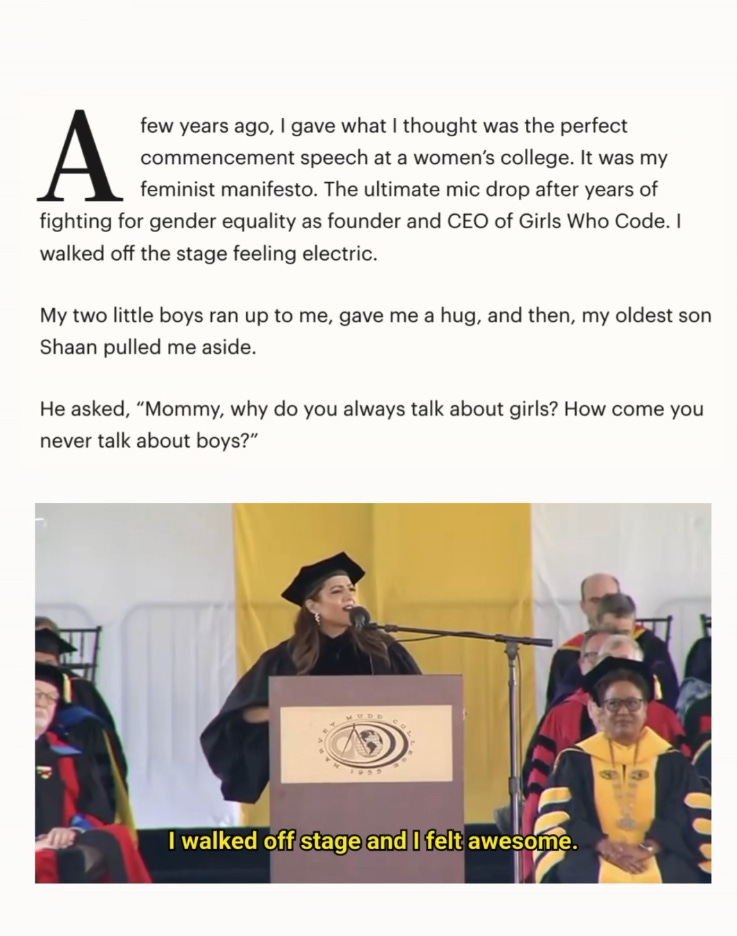
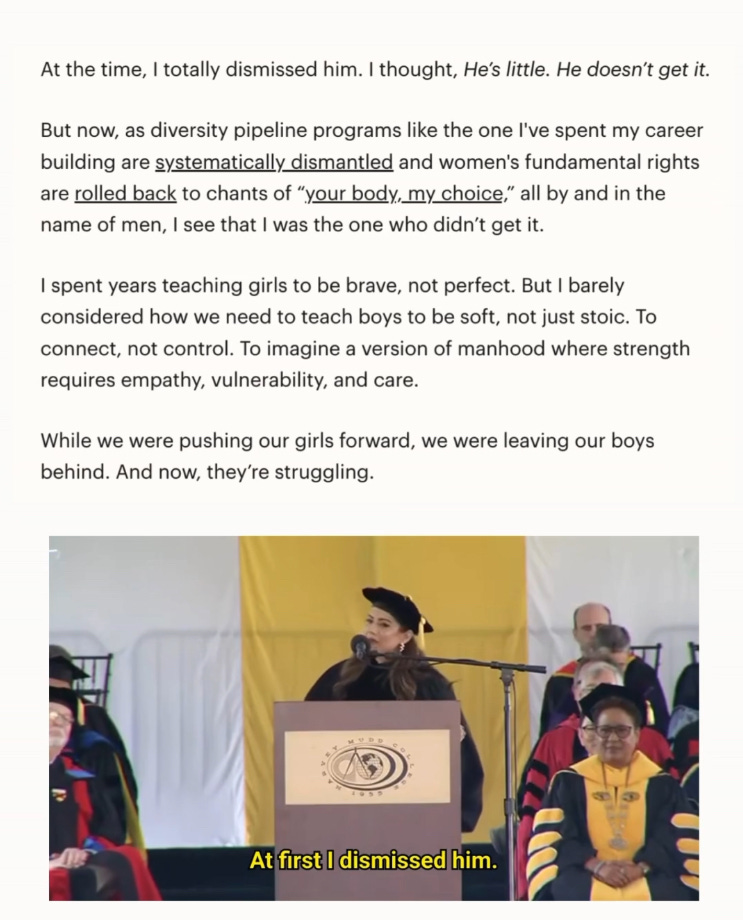
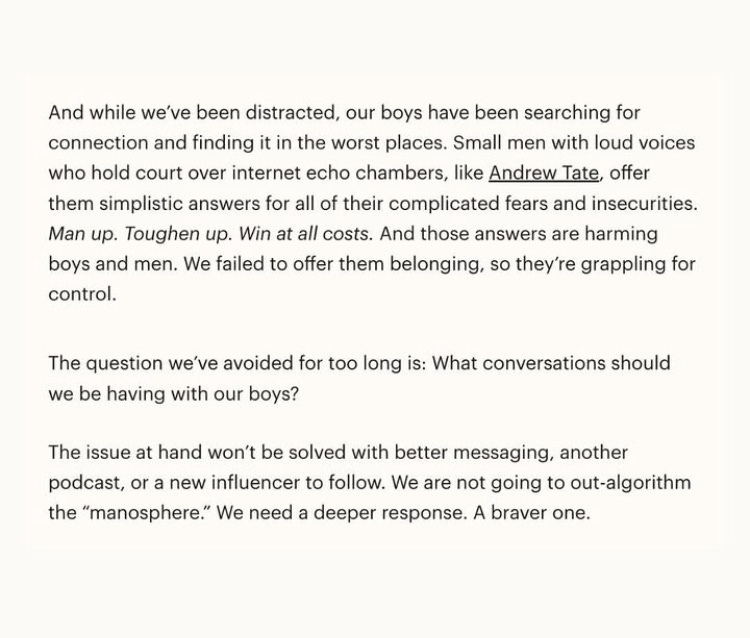
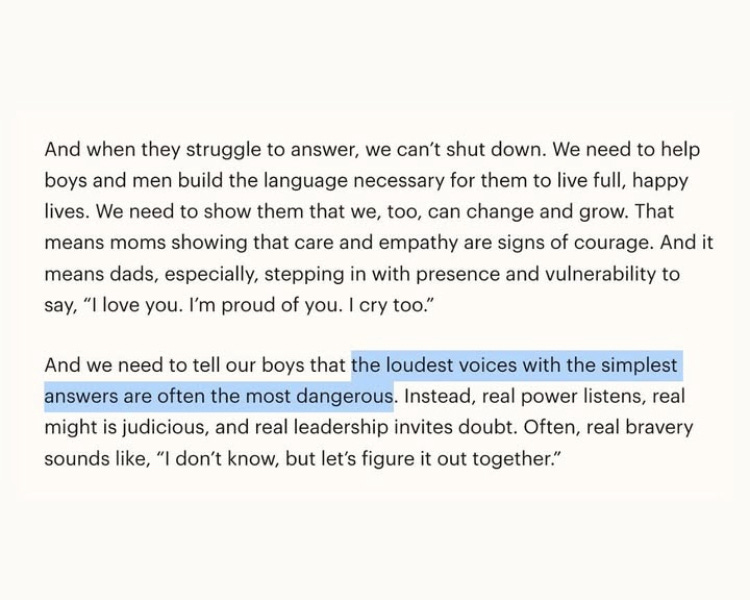
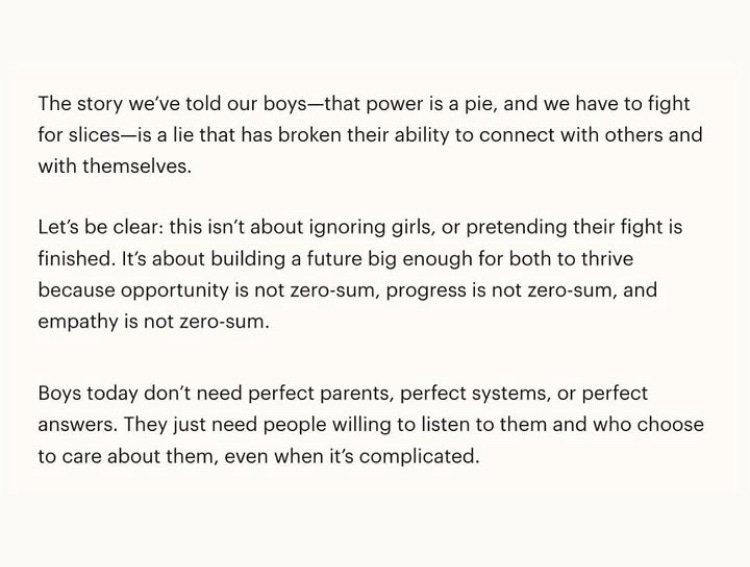





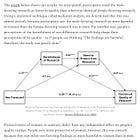

45% of boys are raised by single mothers. 78% of teachers are female. Very, close to 50% of boys have 100% feminine influence at home and 80% feminine influence at school. Toxic masculinity isn't the problem. The lack of masculinity is.
The NYT presents a dude who dresses up in drag as their idea of a masculine male role model? Clueless.